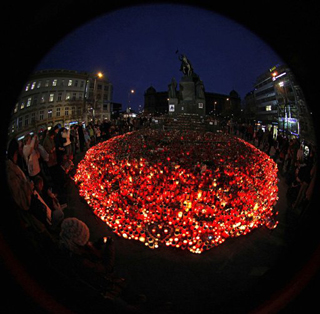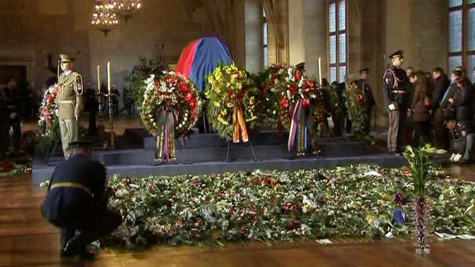Human Flower Project
Learning to Grieve in Prague
The Czechs are noted for their impassive approach to death. Rites for Vaclav Havel may change all that, as Lincoln’s death revolutionized funerals in the U.S..

An outpouring candles and flowers at Wenceslas Square
to mourn the death of former president Vaclav Havel
Photo: David W. Cerny, Reuters
Funerals in the Czech Republic tend to be understated affairs or, in many cases, skipped altogether. With the nation’s secular majority and a culture of silence around the subject of death (in part a holdover from the era of Communist rule) there are fewer religious rites here than in most other nations of the West and, according to scholar Olga Nesporova, only somewhat perfunctory services for non-believers.
Her study criticizes Czech funerary observances for their failure to comfort the bereaved or even address the reality of mortal life.
She writes, “Standard secular funerals today are held in an atmosphere similar to that in the 1970s and 1980s. The speech is formal and usually given by a professional speaker provided by the crematorium, who has no personal relationship with either the deceased or the bereaved, to whom the speaker is introduced no more than a quarter of an hour before the funeral ceremony commences.” Any remarks must fit into “a template” limited to about five minutes. No mention of heaven or hell—or the lack thereof—please.
“The brevity of the funeral address is perhaps not surprising since a speech celebrating the working life and social contributions of the deceased may seem insincere when read by someone who had never met them, and since there is little point in talking of the future when there is no conception of an afterlife. “
Surprisingly, to us anyway, Nesporova’s study makes not one mention of flowers. We assume that’s because obsequies are typically so minimal that flowers don’t even come to mind.
This week, however, the Czechs and their friends around the world staged yet another cultural revolution, this one floral, public, personal, emotional. The nation mourned Vaclav Havel, the playwright, heroic dissident and former president who helped topple Communist rule in Czechoslovakia and led the country into a new era.

The body of Vaclav Havel lay in state at Prague Caste Wednesday, December 21, 2011
Photo: Reuters
Havel died December 18, age 75. Thousands of mourners followed his casket over the Charles Bridge on Wednesday to Prague Castle where his body lay in state. Giant wreaths of ribbons and flowers stood between sentries, and a carpet of bouquets covered the castle floor. Friday a grand service took place at St. Vitus Cathedral, with a dozen mitred clergy in attendance and eulogies from many world and national leaders.
The New York Times reported, “Quite a few people questioned whether the lover of the Velvet Underground and Rolling Stones would have wanted the soaring grandeur of Dvorak’s “Requiem” and Handel’s “Messiah.”” But we believe the Velvet Revolutionary would have relished the outpouring of floral tributes. In death as in life, Havel has summoned the forces of change.

